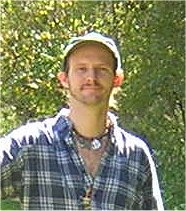Much of what we have come to believe in the world today comes from a belief that everything is one way or the other. That is to say, the belief that there are only two different ways things can be. This is most popularly espoused by our concepts of good and evil: eternally opposed, but the only possible choices.
This dualistic approach to the universe seems to come from the product of our evolution. So often we try to separate ourselves from the world in which we live. Many of our religions deny that we are products of our environment; that we are products of evolution, that we are animals.
Yet, even if we acknowledge that we are an animal species we must somehow understand that something separates us from the other animals on this planet.
Animals are governed by passions and instincts. They react to things as they happen to them: to hunger, to greed, to fear, to lust. These are all survival instincts deeply programmed into every animal. Animals simply react to things as they happen to them.
But humans make changes. We have the capacity to reason: to ask questions and act accordingly based on what answers we discover. The difference between us and the animals is knowledge: the ability to ask questions and seek answers.
In a moment of our prehistory, we began our quest for knowledge, and we began to think of ourselves as different from the animals of this world. This was the moment we stopped being simply another primate species and we became human.
Interestingly enough, the Judeo-Christian religions capture this moment very elegantly in their mythology. For in the second Creation Myth of the Tanakh and the Bible (Genesis 2) is the story of humankind, living in a garden paradise with the other animals. Only when he "eats of the Tree of Knowledge" does he manage to evict himself from the garden paradise. The Garden of Eden is a time, not a place. It is a time before we were truly human.
Being human, we have the ability to reason, but being animals we are governed by our passions. So here is our dilemma: we are trapped between two worlds -- thought and emotion. Just as the character Spock on Star Trek, so must we find our own path between these two. This helps explain why we humans like to think of ourselves as mightier than angels, while we treat each other worse than devils. Angels and devils are simply metaphors for the dual parts of our nature.
This dualistic approach to the universe seems to come from the product of our evolution. So often we try to separate ourselves from the world in which we live. Many of our religions deny that we are products of our environment; that we are products of evolution, that we are animals.
Yet, even if we acknowledge that we are an animal species we must somehow understand that something separates us from the other animals on this planet.
Animals are governed by passions and instincts. They react to things as they happen to them: to hunger, to greed, to fear, to lust. These are all survival instincts deeply programmed into every animal. Animals simply react to things as they happen to them.
But humans make changes. We have the capacity to reason: to ask questions and act accordingly based on what answers we discover. The difference between us and the animals is knowledge: the ability to ask questions and seek answers.
In a moment of our prehistory, we began our quest for knowledge, and we began to think of ourselves as different from the animals of this world. This was the moment we stopped being simply another primate species and we became human.
Interestingly enough, the Judeo-Christian religions capture this moment very elegantly in their mythology. For in the second Creation Myth of the Tanakh and the Bible (Genesis 2) is the story of humankind, living in a garden paradise with the other animals. Only when he "eats of the Tree of Knowledge" does he manage to evict himself from the garden paradise. The Garden of Eden is a time, not a place. It is a time before we were truly human.
Being human, we have the ability to reason, but being animals we are governed by our passions. So here is our dilemma: we are trapped between two worlds -- thought and emotion. Just as the character Spock on Star Trek, so must we find our own path between these two. This helps explain why we humans like to think of ourselves as mightier than angels, while we treat each other worse than devils. Angels and devils are simply metaphors for the dual parts of our nature.





No comments:
Post a Comment